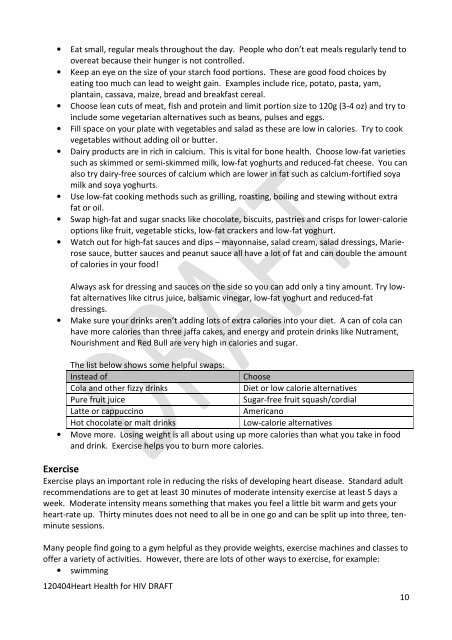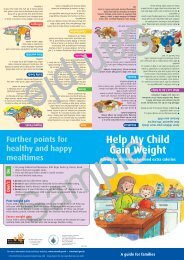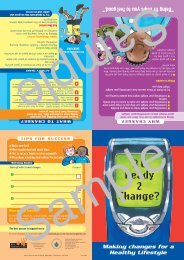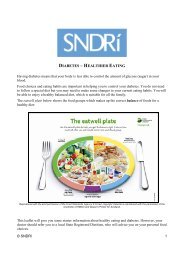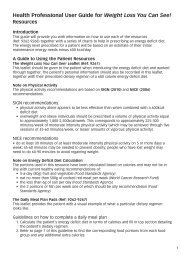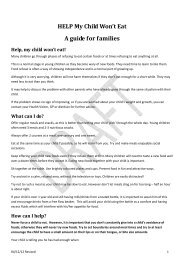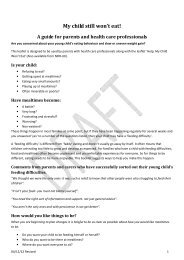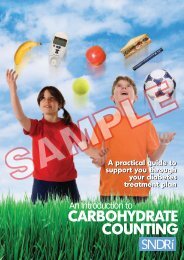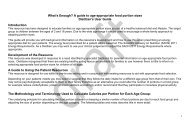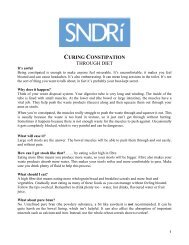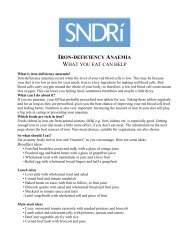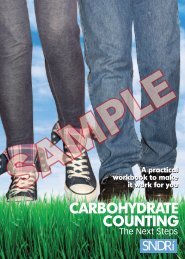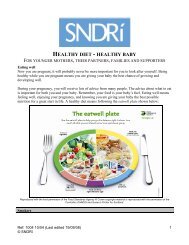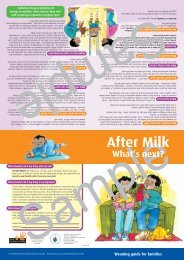Cardio-protective Diet for You - NDR-UK
Cardio-protective Diet for You - NDR-UK
Cardio-protective Diet for You - NDR-UK
You also want an ePaper? Increase the reach of your titles
YUMPU automatically turns print PDFs into web optimized ePapers that Google loves.
• Eat small, regular meals throughout the day. People who don’t eat meals regularly tend to<br />
overeat because their hunger is not controlled.<br />
• Keep an eye on the size of your starch food portions. These are good food choices by<br />
eating too much can lead to weight gain. Examples include rice, potato, pasta, yam,<br />
plantain, cassava, maize, bread and breakfast cereal.<br />
• Choose lean cuts of meat, fish and protein and limit portion size to 120g (3-4 oz) and try to<br />
include some vegetarian alternatives such as beans, pulses and eggs.<br />
• Fill space on your plate with vegetables and salad as these are low in calories. Try to cook<br />
vegetables without adding oil or butter.<br />
• Dairy products are in rich in calcium. This is vital <strong>for</strong> bone health. Choose low-fat varieties<br />
such as skimmed or semi-skimmed milk, low-fat yoghurts and reduced-fat cheese. <strong>You</strong> can<br />
also try dairy-free sources of calcium which are lower in fat such as calcium-<strong>for</strong>tified soya<br />
milk and soya yoghurts.<br />
• Use low-fat cooking methods such as grilling, roasting, boiling and stewing without extra<br />
fat or oil.<br />
• Swap high-fat and sugar snacks like chocolate, biscuits, pastries and crisps <strong>for</strong> lower-calorie<br />
options like fruit, vegetable sticks, low-fat crackers and low-fat yoghurt.<br />
• Watch out <strong>for</strong> high-fat sauces and dips – mayonnaise, salad cream, salad dressings, Marierose<br />
sauce, butter sauces and peanut sauce all have a lot of fat and can double the amount<br />
of calories in your food!<br />
Always ask <strong>for</strong> dressing and sauces on the side so you can add only a tiny amount. Try lowfat<br />
alternatives like citrus juice, balsamic vinegar, low-fat yoghurt and reduced-fat<br />
dressings.<br />
• Make sure your drinks aren’t adding lots of extra calories into your diet. A can of cola can<br />
have more calories than three jaffa cakes, and energy and protein drinks like Nutrament,<br />
Nourishment and Red Bull are very high in calories and sugar.<br />
The list below shows some helpful swaps:<br />
Instead of<br />
Choose<br />
Cola and other fizzy drinks<br />
<strong>Diet</strong> or low calorie alternatives<br />
Pure fruit juice<br />
Sugar-free fruit squash/cordial<br />
Latte or cappuccino<br />
Americano<br />
Hot chocolate or malt drinks<br />
Low-calorie alternatives<br />
• Move more. Losing weight is all about using up more calories than what you take in food<br />
and drink. Exercise helps you to burn more calories.<br />
Exercise<br />
Exercise plays an important role in reducing the risks of developing heart disease. Standard adult<br />
recommendations are to get at least 30 minutes of moderate intensity exercise at least 5 days a<br />
week. Moderate intensity means something that makes you feel a little bit warm and gets your<br />
heart-rate up. Thirty minutes does not need to all be in one go and can be split up into three, tenminute<br />
sessions.<br />
Many people find going to a gym helpful as they provide weights, exercise machines and classes to<br />
offer a variety of activities. However, there are lots of other ways to exercise, <strong>for</strong> example:<br />
• swimming<br />
120404Heart Health <strong>for</strong> HIV DRAFT<br />
10


